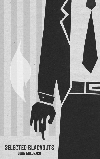
Selected Blackouts
John Goldbach
Insomniac Press
$19.95
paper
172pp
978-1-897178-79-9
Goldbach’s characters – mostly young men – drink, smoke, and curse their way through their daily existence, rarely pausing to reflect. In “Blackout,” the two protagonists experiment with asphyxiating themselves to discover what it feels like, or perhaps just because they are bored. Dave seems to have something of a revelation following one of these experiments: he momentarily forgets where he is and soaks in his surroundings in peaceful silence – the sky, the breeze, the falls. But articulating this is beyond him, so he labels the experience “all right” and he and his friend proceed to drink together and piss into the river in manly silence. The episode does not live up to the promise of the opening section, but it certainly evokes the restless quality of adolescence and that vague, fleeting sense that the world might be larger than the places where you drink with your buddies.
Young adulthood as depicted in Goldbach’s stories is mostly an unhappy, self-destructive period not marked by any great insight or search for meaning. The narrator in “How much do they know?” lets us in on his thoughts as he drinks with friends at a bar at Christmastime, and they are unsavoury. Relishing the details, he provides an inventory of who has slept with or cheated on whom, who may be guilty of rape, who is consuming excessive amounts of drugs, and who he would like to have sex with. His desire to chronicle the misdeeds of his friends borders on ghoulish. The story’s contents are coarse and the characters are an unpleasant and selfish bunch.
But what are we to make of this catalogue of repellant behaviour? At the end of the story, the narrator revels in secret glee at the thought of airing everyone’s dirty laundry: “Oh shit! I cannot wait to let these people know everything about themselves and their lies. It’ll be hysterical. Merry fuckin’ Christmas, motherfuckers!” It is not always clear what the author intends for us to take away from his depressing portraits of human behaviour. More substantive editing might have made these stories stronger.
The occasional bit of humour or gentleness therefore provides a welcome reprieve. “The Sit” appears at first to contain all the ingredients for a thriller: a babysitter in a dark house, a power outage, a young man upstairs who just might be crazy. Instead it develops into a conversation about writing, rejection, and the terrifying power of the imagination. “Odin Létourneau and Debbie Siskind’s Second Date” is only two pages long, but it is punchy, with a pleasing dose of absurdity. Goldbach is at his best with his shortest stories, which are concise, evocative, and free of the rambling quality of some of his longer pieces, mRb






0 Comments